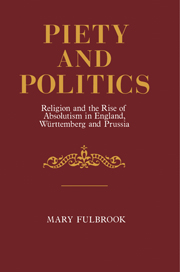Book contents
- Frontmatter
- Contents
- Preface
- 1 Introduction: cases and controversies
- 2 In pursuit of further reformation
- 3 State and society: the attempts at absolutism
- 4 The established church and toleration
- 5 From reform to revolution: Puritanism in England
- 6 From reform to retreat: Pietism in Württemberg
- 7 From reform to state religion: Pietism in Prussia
- 8 Conclusions and implications
- Bibliography
- Index
3 - State and society: the attempts at absolutism
Published online by Cambridge University Press: 09 January 2010
- Frontmatter
- Contents
- Preface
- 1 Introduction: cases and controversies
- 2 In pursuit of further reformation
- 3 State and society: the attempts at absolutism
- 4 The established church and toleration
- 5 From reform to revolution: Puritanism in England
- 6 From reform to retreat: Pietism in Württemberg
- 7 From reform to state religion: Pietism in Prussia
- 8 Conclusions and implications
- Bibliography
- Index
Summary
Puritans and Pietists were aiming at similar ends: the spread of a living, active Christian faith based on the Word of the Lord as expressed in the Scriptures; and the reformation of this world in the light of God's Word. The ways in which they became involved with the political conflicts of their times have much to do with certain differing features of the sociopolitical landscapes in which Puritans and Pietists sought to establish God's Kingdom on Earth. In this and the following chapter we shall examine those aspects of the contexts of the three movements which together help to explain why similar religious movements should make such different political contributions. It will then be possible to examine more closely the divergent patterns of development of the movements, showing how in each case Puritans and Pietists faced varying obstacles to achievement of their religious aims and developed different strategies of political action, attitude, and alliance.
Common to each of the three cases was the incipient trend towards absolutist rule: the attempts being made by rulers to centralise power, to reduce the role of the Estates in the tradition of the late mediaeval Ständestaat. This trend was not a later invention of systematising historians, unnoticed by contemporaries. As certain members of the English Parliament put it in the 1604 Apology of the Commons, expressing their disquiets in the light of continental European developments:
What cause we your poor Commons have to watch over our privileges is manifest in itself to all men. The prerogatives of princes may easily and do daily grow; the privileges of the subject are for the most part at an everlasting stand. […]
- Type
- Chapter
- Information
- Piety and PoliticsReligion and the Rise of Absolutism in England, Wurttemberg and Prussia, pp. 45 - 75Publisher: Cambridge University PressPrint publication year: 1983



